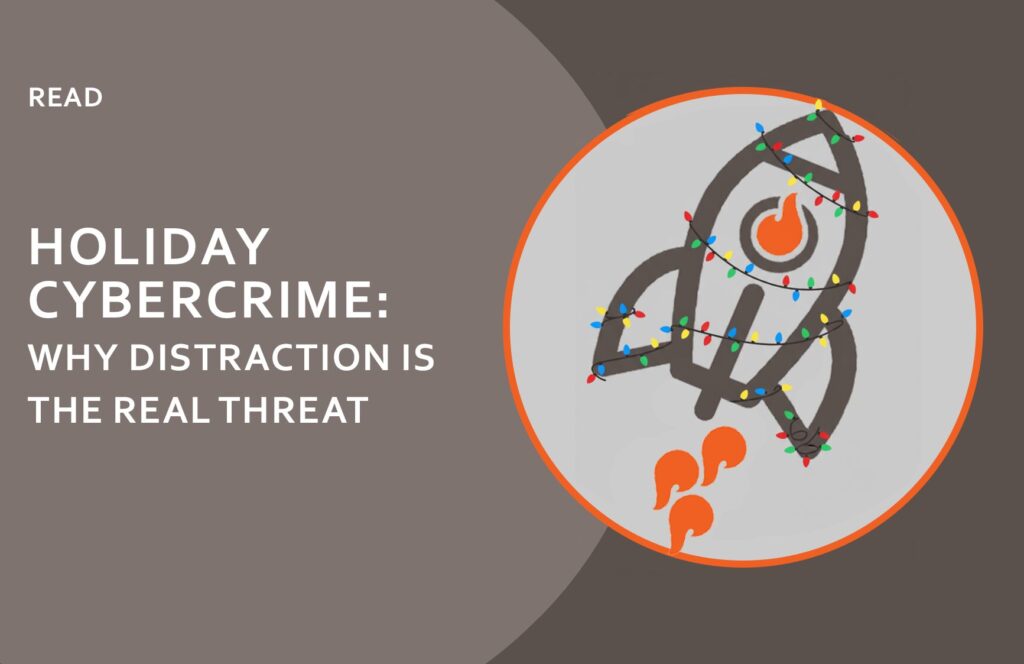READ: Holiday Cybercrime: Why Distraction Is the Real Threat

The Myth of the Busy Hacker
Every year, headlines warn that “cybercriminals ramp up during the holidays.” The truth? They don’t have to. Criminals are just as active in July as they are in December. What changes is us. The holiday season means busier schedules, staff taking time off, year-end financial deadlines, and lots of multitasking. That distraction is exactly what attackers count on.
The result: it feels like there’s a cybercrime surge when really, it’s our guard that’s down.
Are Cybercriminals Busier During the Holidays?
No. Attackers don’t suddenly work harder in December. The real risk is that we are more distracted.
Context: Staff shortages, employees rushing to close year-end tasks, and more financial transactions all make it easier for fraudulent invoices, phishing emails, or suspicious requests to slip through.
Takeaway: The problem isn’t hyperactive hackers, it’s reduced vigilance during a stressful season.
Why are Small Businesses Especially Vulnerable During the Holidays?
Small businesses run lean year-round, which magnifies holiday risks.
- Faster approvals: Invoices and payments get rubber-stamped without double-checking.
- More noise: Fake shipping notices and invoices blend into the real ones.
- Burnout: Stressed employees are more likely to click or approve without verifying.
Takeaway: Just because you’re on vacation (or about to leave for it), doesn’t mean you can take a vacation from being vigilant
What Holiday Scams Should Small Businesses Watch For?
The holidays amplify familiar threats, making them more effective.
- Phishing & “vishing” (voice phishing): Fake invoices, urgent shipping updates, or phone scams requesting account details.
- Business Email Compromise (BEC): Rushed clicks on the wrong link can trigger weeks of cleanup.
- Ransomware timing: Attacks often hit holiday weekends, when no one is watching.
- Vendor fraud: Fake payment instructions hidden among real vendor requests.
Takeaway: The scams don’t change. Our seasonal distraction just makes them easier to pull off.
How Can Small Businesses Protect Themselves During the Holidays?
- Assign on-call coverage – Even minimal monitoring reduces blind spots.
- Pause before approving – Train employees to “stop and verify” unusual requests.
- Double-check vendors – Confirm invoice or payment changes directly.
- Run a refresher – A 15-minute reminder on holiday scams keeps awareness sharp.
- Keep your incident response plan ready and consider refreshing it with an Incident Response Tabletop.
Takeaway: A few small adjustments can keep year-end stress from turning into a full-blown cyber incident.
The OrbitalFire Perspective
Hackers don’t suddenly get busier in December. But when your team is distracted, their job gets a whole lot easier.
That’s why OrbitalFire delivers defenses that work year-round, not just during “Cybersecurity Awareness Month” or seasonal spikes. Because cybercrime doesn’t take a vacation—and neither should your defenses.
To learn more about building a Culture of Security, Reach Out to Chat.
Read more about creating a Culture of Security that doesn’t take holidays off, READ: Why Cybersecurity Accountability for Small Businesses Starts with One Name
For more on protecting your organization from Phishing, READ: The ‘GAUGES’ Method of Spotting a Phish








